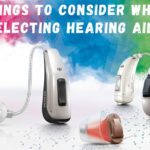Clear and open communication is the crux of the relationships we have with loved ones. When someone is living with undiagnosed or untreated hearing loss, it can weigh heavily on social interaction and cause tension and frustration. It may also be difficult to know that hearing loss is to blame. We may mistakenly assume that our loved one is just not listening or is uninterested in our conversation.
Identifying the signs of potential hearing loss can be as easy as asking a few questions. Does your loved one constantly ask people to repeat themselves? Do they listen to the television or radio at extremely high volumes? Do they seem isolated during social gatherings? These could be indicators of hearing loss and should not be ignored.
If you think a loved one could be living with hearing loss, you may be inclined to offer help. It may be a difficult conversation to have because of the age-related stereotype and shame surrounding hearing loss. On the contrary, with over 48 million American living with disabling hearing loss, it is the third most common medical condition of adults 18 and over.
It’s important to treat hearing loss as soon as possible. If you have a loved one that you believe needs to have their hearing checked, below are some tips to be supportive and encourage them to see a hearing specialist.
Do Some Research
Before making the trip to a specialist, access the myriad of online tools available regrading hearing loss. There are many studies available that show the detriment to the other areas of life affected by untreated hearing loss: family, career, social life, and mental and physical health. Studies from Johns Hopkins have shown that cognitive abilities are adversely affected and an increased risk for developing dementia are results of untreated hearing loss. More studies still demonstrate the lower wages earned in the workplace and a higher risk for accidents, falls, and hospitalization.
Knowing about some of the complexities associated with hearing loss and having information at the ready are great ways to begin a conversation with a loved one.
Timing is Everything
Often hearing loss can be accompanied by speech recognition impairment. This is one of the ways untreated hearing loss affects communication. Choose a quiet, well-lit environment, as opposed to a crowded cafe or bustling restaurant. Those environments aren’t conducive to your loved one hearing well.
While you’re talking, sit facing your loved one in case they need to read your lips. Think about small ways in which you can accommodate their hearing loss. It goes a long way toward effective communication and relieves any anxiety they may have about asking for those accommodations themselves.
Discuss Personal Experience
Hearing loss can be a sensitive topic to discuss and the last thing you want to do is put your loved one on the defensive. Instead of voicing your annoyance and anger, talk about instances that have been difficult for you. Be specific. Use “I” statements, as opposed to confrontational, often blaming, “you” language.
Open Your Ears
The other part of your job is to listen to your loved one. Listen without interrupting and support them as they share their experience, which might be emotional, difficult, or frightening for them. Ask open-ended questions and give them space to share how they have been adjusting to this change.
Motivate Them to Get Their Hearing Tested
A feeling of isolation can often accompany hearing loss. Your loved one will greatly appreciate your support during their journey to better hearing health.
First, schedule an appointment for a hearing test. A hearing test will provide your loved one thorough information on their hearing abilities and determine if a hearing loss exists. If it does, the hearing health professional will recommend appropriate hearing aids or listening devices (see our hearing aid prices). Show your continued support by volunteering to take the online hearing test with your loved one and accompany them to the doctor’s office. Your very presence could ease any anxiety about visiting a doctor’s office, being examined, and receiving results. It may even boost their confidence enough to ask questions and build a trusting relationship with their hearing health professional.






